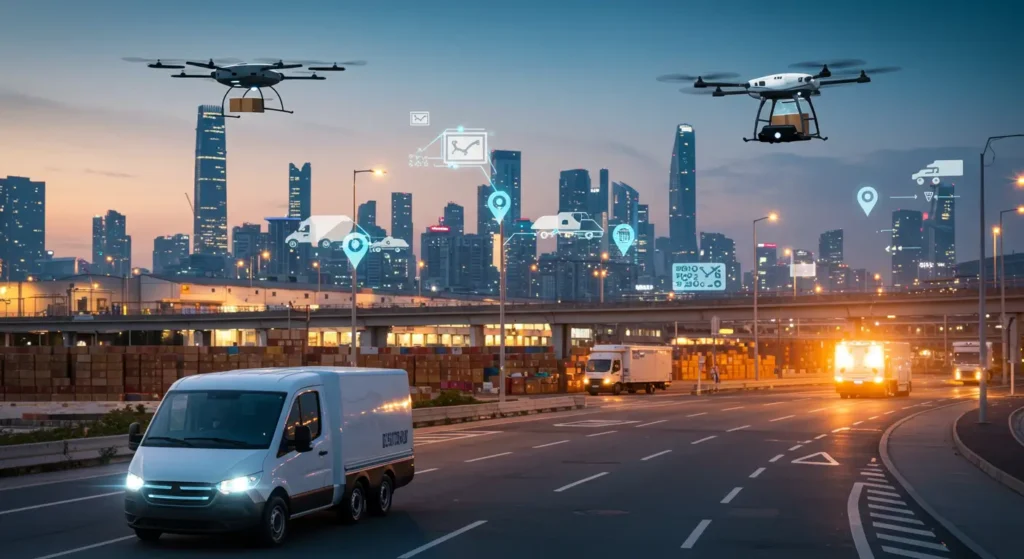Have you ever wondered how your online orders arrive so fast, even from another country? Behind every delivery is a huge system of trucks, warehouses, and workers. But sometimes, things go wrong-packages are late, stores run out of items, or goods get lost.

In this post, you’ll learn how artificial intelligence (AI) is solving modern logistics and supply chain challenges. By the end, you’ll see how AI is changing the way products move around the world.
How AI Is Making Deliveries Faster and Smarter
One of the biggest problems in logistics is planning the best delivery routes. Trucks can get stuck in traffic, weather can slow things down, and road closures cause delays. AI helps solve this by finding smarter and faster routes in real time.
This technology is not only used for trucks. It also helps ships, trains, and airplanes.
AI can track different types of vehicles and suggest changes if something unexpected happens. Smarter routing helps both the companies and the people who are waiting for their packages.
Predicting Problems Before They Happen
Another way AI helps is through predictive analytics. This means AI looks at a lot of data from the past to guess what might happen in the future. In the supply chain, this can be very helpful.
AI can also spot signs that a machine in a warehouse might break soon. This lets workers fix it before it causes bigger problems. Predicting things before they go wrong helps keep everything moving smoothly.
Keeping Track of Everything in Real Time
In the past, it was hard to know where a package was once it left a warehouse. This means you can check your phone and see exactly where your package is at any moment. AI looks at GPS signals and other data to give accurate updates.
If a delivery is running late, they can alert the customer or make other plans. If something gets lost, they can find out what went wrong more quickly. Real-time tracking helps companies fix problems fast and keep everything under control.
Helping Warehouses Run Better
Warehouses are busy places. Workers need to find items quickly and send them out on time. AI is helping make warehouses more organized.
Some warehouses even use robots that are guided by AI. These robots pick up products and carry them to the packing area.
AI tells them the best path to take so they don’t bump into each other or slow things down. With help from AI, warehouses can handle more orders without needing a lot more space or workers.
Planning for the Right Amount of Stock
Keeping the right amount of stock is a big challenge. Too little, and customers get upset.
Too much, and items sit around, taking up space. AI helps with inventory management by looking at past sales, customer behavior, and even weather forecasts.
If rain is coming, stores might sell more umbrellas. If a new video game is launching, stores may need more copies.
AI can study all this data and help companies plan better. It helps them order the right amount of stock at the right time. This means fewer shortages and less waste.
Working Together More Easily
In a supply chain, many people work together. There are suppliers, manufacturers, warehouse managers, and delivery companies.
Sometimes, poor communication can cause delays. AI helps everyone stay connected. It shares updates across the system so all teams know what’s happening.
For example, if a factory is running behind schedule, AI can send an alert to the warehouse and delivery team. They can adjust their plans right away. This makes the whole system more flexible.
It also helps reduce costs because fewer mistakes are made. When everyone shares the same information, things run more smoothly.
Making Greener Choices
AI also helps make supply chains better for the planet. One way it does this is by choosing routes that use less fuel.
It can also help companies use fewer trucks by filling them up better. This means fewer trips and less pollution.
AI can also help reduce waste in warehouses and stores. If companies know how much they really need, they don’t order extra items that go unused. By making smarter decisions, AI helps create a greener and more sustainable supply chain.
The Role of AI Consulting in Logistics
Not every company knows how to start using AI on its own. This is where AI consulting in logistics can help. Experts in this area work with businesses to find the best ways to use AI tools.
They help choose the right software, train staff, and set up systems that fit the company’s needs. By using expert help, companies can see results faster and avoid costly mistakes. This support is especially helpful for small and medium-sized companies that want to stay competitive.
Challenges That Still Need to Be Solved
Even though AI has made big improvements, there are still some problems. AI systems need a lot of data to work well. If the data is wrong or missing, the results can be bad.
Some companies also worry about the cost of setting up AI tools. It can take time to see the benefits.
Another concern is training. Workers need to learn how to use the new systems. Some people worry that machines will take over their jobs.
But in most cases, AI helps people do their jobs better instead of replacing them. It’s important to plan carefully when bringing AI into a business.
What the Future Might Look Like
AI is still growing and changing. In the future, we might see self-driving trucks that make deliveries on their own. Drones could carry packages through the sky.
More warehouses will likely use robots that work side by side with humans. These ideas may sound like science fiction, but some of them are already being tested.
As AI gets better, it will make supply chains even faster, safer, and smarter. Companies that start using AI now will be ready for the future.
Those who wait might fall behind. AI will play a big role in how products move around the world.
Source: https://baddiehub.news/
Ready for Smarter Logistics?
AI is transforming logistics with smarter routing, predictive analytics, and real-time tracking to boost supply chain performance. From better delivery routes to fewer delays and greener choices, AI is making a big difference. It helps companies work faster and smarter while saving money and keeping customers happy.
Even with some challenges, the future of AI in logistics looks bright. Did this guide help you? Browse the rest of this section for more advice on a variety of topics.






